- Home
- David Guterson
The Other Page 5
The Other Read online
Page 5
John William and I celebrated our release from high school by dropping, each, a tab of acid. Things went well, for me at least, as we wandered on foot through downtown Seattle, with cars passing us or coming toward us in the early-film-era style of moving objects in a stereopticon, and with every citizen on the sidewalks emotionally transparent. I had a mental battle with an alley cat—an eye-to-eye contest of wills I won with my third eye—and stopped a bus with a spread hand. All sound approached slowly and in increments, then left the same way. I knew who was dangerous and who wasn’t, effortlessly. However it was—and not to make too much of the experience of psychedelia—at some point John William’s sobbing registered with me as something not to be absorbed any longer. I’d watched his tears, even gathered a drop from his cheek on a scrap of paper so as to examine its stain; nevertheless, his crying had seemed not only distant but, however unhappy, required. With every wail, more grief passed out of him, permanently expunged, I felt—in fact, for me this was tangible, and his escaping sorrow had a color, a darkly burnished orange, that I perceived as an emanation. I saw his sadness as a bloodletting, and I was happy for my friend. But then things changed. The working of lysergic acid in the brain can produce dramatic shifts, and I came into an awareness of John William’s nightmare. A shroud descended, and the cast of things altered. I found myself beneath the glass roof of the iron pergola in Pioneer Square, with my back against a stanchion, looking north toward the Seattle First National Bank Building at Fourth and Madison—Seattle’s first skyscraper, and at that point its only one—and it terrified me, this dark monolith. All night, John William had been mumbling something under his tears, and now I finally homed in on his mantra as he curled on the cobblestones a few yards away from me with his hands clutching his face, as if in so doing he could hide from the truth of things—“No escape from the unhappiness machine…No escape from the unhappiness machine…No escape from the unhappiness machine…No escape from the unhappiness machine…” I started chanting that, too.
2
NOW THEY WOULD HAVE THE RUN HOME TOGETHER
EARLIER THIS SUMMER, for the first time in eleven years, I hiked in the valley of the South Fork Hoh, where John William and I went without a compass or matches two days after our acid trip, and where John William spent seven years living alone. The trail passes under Sitka spruces, some more than five hundred years old, and under bigleaf maples hung with club moss. You would have to say that, given the presence of these maples, this isn’t quite your classic rain forest but a variation, with the maples thriving amid cobbles and rockslides and in the glacial till of the river bottom. Rain on the South Fork Hoh is common, but on my recent walk there was no sign of rain—instead, it was warm, and a little dusty where the silt had baked in the sun on the north bank. Still, rain remains this region’s most obvious feature in any season but summer. Notable, too, is the silence here, broken infrequently by the winter wren’s trill—reminiscent of a hysterically played flute—at other times by the ventriloquy of ravens. Then there’s the din of the river, fed by snow in the Valhallas and glaciers on Mount Olympus. In June, the South Fork Hoh runs gray and milky. It’s in places slow enough to suggest tranquillity, but elsewhere it’s extreme in its energy and character. So this is a hike of disparate feeling, unfolding under a dense forest canopy broken by glades of arcadian maples. It’s also a hike through lonely country, four and a half hours by car from Seattle, infrequently visited not only for this reason but because the main fork, a few miles to the north, has a better road and a visitors’ center near its bank. More, the main-fork trail takes climbers to Mount Olympus, whereas the South Fork Trail just leads to deeper gloom and, eventually, into a canyon. Sometimes anglers will try the South Fork’s upper stretches; even more rarely, a party of climbers will pass through on its way to the Valhallas, though I should point out that the first ascents of those peaks were mostly made in 1978, and none earlier than 1966, which should give you some idea of their remoteness. When John William and I first went there, in ’74, wandering into Valkyrie Creek Basin and making camp on Valhalla Ridge, the pinnacles of Bragi, Mimir, Vili, Sleipnir, and Vidar North and South had not yet been climbed, and this wasn’t because of their difficulties but because few climbers had gotten to them. They might have been busy with more accessible mountains, or maybe they hadn’t noticed this part of the map yet, southeast of the town of Forks.
This June, I walked alone on the South Fork Hoh Trail, three days after the end of the school year, one day after the graduation ceremony held, because of foreboding skies, in our remodeled gym, where students hooted as I strode to the podium in order to recite, into all that space, underneath a raised basketball hoop, “The Road Not Taken.” I have an annual date with Frost at this ceremony, and in the past have read the poem’s well-known final lines with embarrassed misgivings: “Two roads diverged in a wood, and I—/I took the one less traveled by, / And that has made all the difference.” Will the narrator’s apparent self-regard accrue to me? Will the convocation, seeing Frost’s narrator as superior, see me as superior by association? This year, after I cleared my throat, a student yelled, “C’s all filthy!,” meaning “Mr. Countryman’s rich,” and after everyone twittered, I delivered the Frost. The following day—the first of vacation—I got up early, filled my thermos with coffee, made a sandwich, and drove away before first light, and, frankly, despite the things I like about my work, felt glad I was free to walk along the South Fork Hoh instead of teach. It’s an easy journey in its lower reaches; in three miles a hiker gains five hundred feet, and after that, where the trail fades to moss, it’s a matter of meandering across soft green flats or treading on gravel bars near the current. I found myself preferring moss to gravel, even though there’s less gloom beside the water, because recently I’ve developed a Morton’s neuroma where the third and fourth toes on my right foot meet, and this makes me wince if I walk too many hours on unforgiving surfaces like river stones. Pain gives me reason to stop more often than I once did. I take off my boots. I eat a little something, or shut my eyes for a few minutes. Sometimes I lie in the fetal position and try, unsuccessfully, to sleep in the forest. It was in this posture, in June, that I heard a trilling winter wren and, later, a raven. The raven’s call was like water dripping loudly—like large drops of water striking a pool. It seemed to have nothing to do with nature; instead, it sounded like a plumbing problem. I wouldn’t have thought it was made by a bird at all except that on other occasions I’d watched ravens make this noise, though even with such clear verification it’s a note that still seems improbable and dreamlike. As does the past, sometimes.
John William and I, finished with high school, came at the South Fork Hoh from its headwaters, entering the woods at Boulder Creek Campground, and traversing the Bailey Range over four cloudless days, finally departing from published routes beneath Mount Olympus, where at close to eight thousand feet you can smell salt water on the wind. From there we found our way to the South Fork Hoh—which we didn’t know was the South Fork Hoh, because we didn’t have a map or compass, by intention—or, rather, to where it gathers in a moraine of icy water and wind-blasted scree, and then, walking in the river itself while the current wrapped around our legs, and using a climbing rope in watery belays, we came down from the high country in a canyon. Between rock walls, the falling water was so loud we couldn’t speak to each other. Trees grew from clefts in the cliffs or lay askew in the current. It seemed to me our purpose was to drown. Climbing down vertical walls in a river was something you had to be young to try, a form of lunacy, and yet my friend’s face was animated by happiness. Water dripped from his well-made chin. He’d come all this way committing landmarks to memory, so that we might, if necessary, reverse our course, and there was something in this epic mental effort, I saw, that appealed to him as an adjunct to danger.
Finally, things calmed. At midday, we sat by a pool under high slopes, taking the brief sunlight there and tossing stones competitively. We built a rock cairn, too,
on a flat boulder in midstream. We were buzzed by a kingfisher, which we saw as a good omen, that the canyon might soon open into more passable country, which it did in the afternoon. Through the long twilight we walked along a tributary into deeper forest. The cedars here looked especially hoary because of their bare withes, which hung like deadwood. Later, we needed a drying fire and tried John William’s flint, steel, and char cloth, and though we did eventually produce sparks and smoke, in the end we used up the last of his char cloth without conjuring flames. It’s difficult, making fire this way. It’s an effort that makes you appreciate the achievement in a match. But it was warm in the June woods, and we slept on moss that night, with our boots and socks drying in our sleeping bags. The next morning, our tributary became dispersed and transient, and we left it in favor of keeping ramparts on our right. I remember sitting in dense woods, playing chess with John William on the type of miniature board air travelers used before the advent of laptops, my friend lying back on one elbow and crossing his ankles like a country squire at leisure, but shirtless and in baggy wool pants. Hair in his eyes, he made his moves with an anticlimactic nudge, then scratched his mosquito bites, teeth set in an impatient overbite, while I contemplated. As I recall, we played to a stalemate. It’s hard to understand why we wanted to spend so many days in the back country with little food, no fire, no map, and no compass, but maybe it was partly for that interlude of chess, for the disparity between chess and where we found ourselves. John William and I played a match of attrition while reveling in our isolation and eating the last of our raisins. Finally, we were only pushing lonely kings and pawns around the board, and the space between two moves became, for both of us, a nap. I felt languid after so much time in the high country and after banging against the boulders in the river, and to loll there in the warm breeze of the forest, my limbs at rest, was a luxury. I slept deeply, rare for me in daylight. When I woke, John William was reading Outdoor Survival—the manual he’d brought for our North Cascades debacle, too—with his head propped on his pack. He wanted to look for yew wood now, as appropriate material for a fire drill. Fire, he said, was “the key to everything.” I didn’t ask what he meant—what “everything” included—and after a while we pushed ahead into more gradual terrain, where the trees were widely spaced and so uniform around that the girth of each rose like the shadow of the next. On exposed stones, we crossed a stream; beyond that the land flattened. Through the branches overhead, a rock wall rose higher than we could see, disappearing into the canopy. This was a country of easy walking: no thrashing through swales of devil’s club and slide alder. We stopped to make camp in the early evening, and I sat on a log, wrapped in my sleeping bag, while John William tried again to conjure fire. He had a yew-wood drill and a cedar fire board now. He would drill for a while, then alter something—push tinder around, carve a fresh notch—or scrutinize the diagram in Outdoor Survival. I helped a little by prodding at the tinder; once, I put my cheek to the ground in order to blow softly on an ember, which went out. At that moment, I thought I was responsible for our failure. Maybe if someone else had done the blowing. But still we persisted, taking turns with the drill, which tired our shoulders. Yet our most energetic attempts produced no more smoke than a blown-out candle. The friction of the yew turned the cedar to black powder, warm but never combustible.
In the morning, about a half-mile away, at the base of a limestone cliff, we found a seep, which at first was nothing more than a sulfurous vapor we noticed while looking for denser yew wood. Seeing algae crusting a few nearby rocks, we clawed with our ice axes until a small, warm pool gathered. It was like finding a vent on the sea floor, so rare and unexpected is a hot spring in the Olympics. (Counting ours, there are only three.) John William and I went on picking at the limestone; for much of that day we excavated, until our pool was approximately on the order of a bathtub. Then we stripped, stepped in, and crouched there for a while, but the water hadn’t settled yet, so this was a little like soaking in hot mud. We had to pour creek water over our limbs to rinse the stain out.
That evening, we stayed near our handiwork for its warmth, and as time wore on—we had nothing left to eat—it began to look less roiled. We sat wearing our sleeping bags like capes, with the pool producing its mineral effluvium, and our bare feet propped on rocks near its waters so as to warm our soles. I remember reading the first-aid pamphlet inside my kit as an antidote for boredom while John William carved a fresh fire drill from a length of yew. He wanted an abrupt transition, he said, between two diameters, as suggested in Outdoor Survival, so that a disk of pine with a hole at its center could be slipped partway down the shaft as a rest for his drilling hands. After a while, this ancient device was ready. We threw off our sleeping bags and knelt by the fire board. The twilight in June is long, and we used about all of it, working in near darkness. At the edge of the pool, with the kind of humorless diligence John William was prone to—me, too—we finally made the flash point for cedar tinder. The powder churning at the point of the drill turned briefly orange and then rolled into our pile of deliberately arranged shavings, where John William blew it into flames.
Six years before, in ’68, there’d been a band called The Crazy World of Arthur Brown, known almost exclusively for its song “Fire,” which was on the charts for a while, so that you heard it often on the radio, and it was this that John William quoted at that moment—“I am the god of hell fire and I bring you: fire!”—which made us both laugh. We fed the flames, throwing our shadows against the cliff wall—where their skewed shapes formed a backdrop for lofting sparks—and celebrated not only fire but ourselves. John William said, “We can’t tell anyone about this place. I mean it. We have to have a blood pact. We have to cut our palms and shake hands.”
I said, “That’s some corny bullshit.”
John William dug his knife from his pocket. “Neil,” he said, “don’t wimp out.”
It hurt. But the hard part was doing it, not the pain. As you might expect, every time you move the blade toward your hand your brain stops you. John William got it done after one false start, but I pulled back three times while he bled. “Pretend it’s not your hand,” he advised.
I finally opened my palm down the center. I’d cut myself before, but only accidentally. This was different; I didn’t feel damaged.
John William and I opted for the soul shake. It didn’t start with white guys, but white guys can understand at least part of it, and since it seemed right for this occasion, a deeply solid contact, thumbs clamped, arms crooked, the weight of each brother in a fleeting, felt balance, we mingled our blood that way.
MY MOTHER DIED when she was thirty-nine, a month before I turned thirteen. She had a Grade 4 astrocytoma—an aggressive brain tumor—that didn’t take long to blind and kill her. What I remember best is that her singing voice still moved me right up until a few weeks before the end. I remember her singing “The Maid of Llanwellyn” in a lilting a cappella, even after she’d gone cross-eyed. Of course, she knew that my sister and I, and my father if he was home, could hear her singing from elsewhere in the house, and she also knew, I’m sure, that it got to us. I used to stop what I was doing when she sang. I guess I poised myself to ponder more clearly, with the evidence for it plainly in my ears, the trajectory of her last days. A few times, I sat in a closet and plugged my ears, because listening made me angry. Even at twelve, I understood that my mother sang in an emotional register no listener could easily ignore. One day, seeing her at the piano with only a little hair on her head, I realized I hadn’t heard her sing for a while, and after that she didn’t sing anymore, and then she didn’t play the piano, either. I’m not sure, but I think she chose not to sing, late in the game, because she didn’t care for what she heard.
It was July, and we skipped the Cavanaugh reunion. My father went on working, but he lost weight. He owned a battery-operated shortwave radio, and I walked the streets carrying that on my shoulder, the way kids carried boomboxes in the eighties. It was ’69, so
there was good music on FM. One place I liked to go was a half-lot with a transformer station behind a chain-link fence, where I’d loll in the shade with the radio beside me. I also walked railroad tracks, breaking every bottle I could find.
People, it’s said, die in character. After she was told about the astrocytoma, my mother, for a while, tried to learn Gaelic and got interested in the Book of Kells. She bought a book of Irish tales, which I inherited by default—“Oisin in Tir Na nOg,” by P. W. Joyce; “The Legend of Knockgrafton,” by T. Crofton Croker; and so on. Wraiths, corpses, coffins, graveyards, solitary ruins, sorrow on the wind, and landscapes of gray loneliness. Characters are hounded toward death, or wither, or freeze, or slide into the sea, and in the end the storyteller will say something like “The blessing of God on the souls of the dead!” or “Thus did the hermit lay the four children of Lir to rest at last.”
At the funeral, Carol refused to look at our mother, but I went up and saw that her face had been arranged in approximately the expression I’d seen at Alpental when she snow-sprayed my father with rental skis. My mother in death had a mischievous regard. As the coffin was lowered, Carol laid flowers. At the same moment, my father took off his sunglasses and put his carpenter’s hand on my biceps. It stayed there until the coffin was in the ground, and then my father slid his sunglasses on and, done holding himself up, removed his hand.

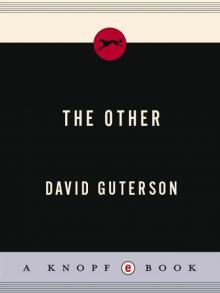 The Other
The Other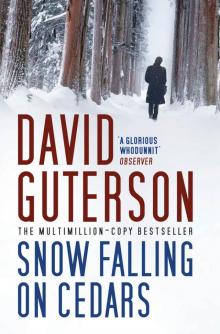 Snow Falling on Cedars
Snow Falling on Cedars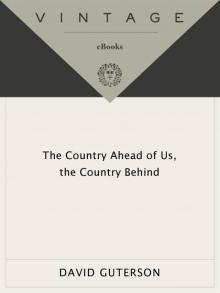 The Country Ahead of Us, the Country Behind
The Country Ahead of Us, the Country Behind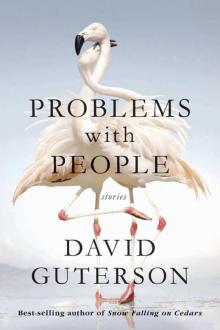 Problems With People: Stories
Problems With People: Stories East of the Mountains
East of the Mountains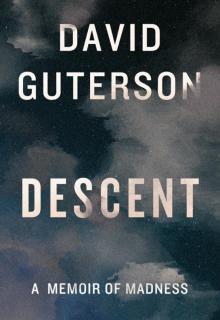 Descent: A Memoir of Madness
Descent: A Memoir of Madness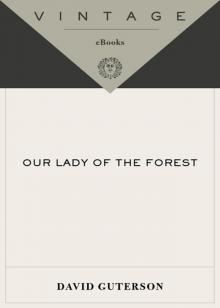 Our Lady of the Forest
Our Lady of the Forest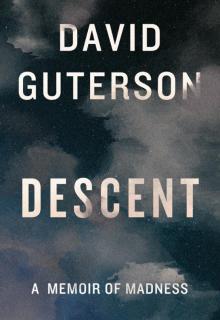 Descent
Descent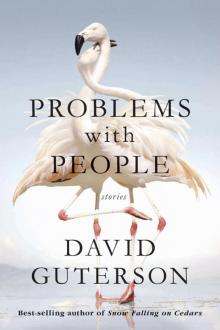 Problems with People
Problems with People